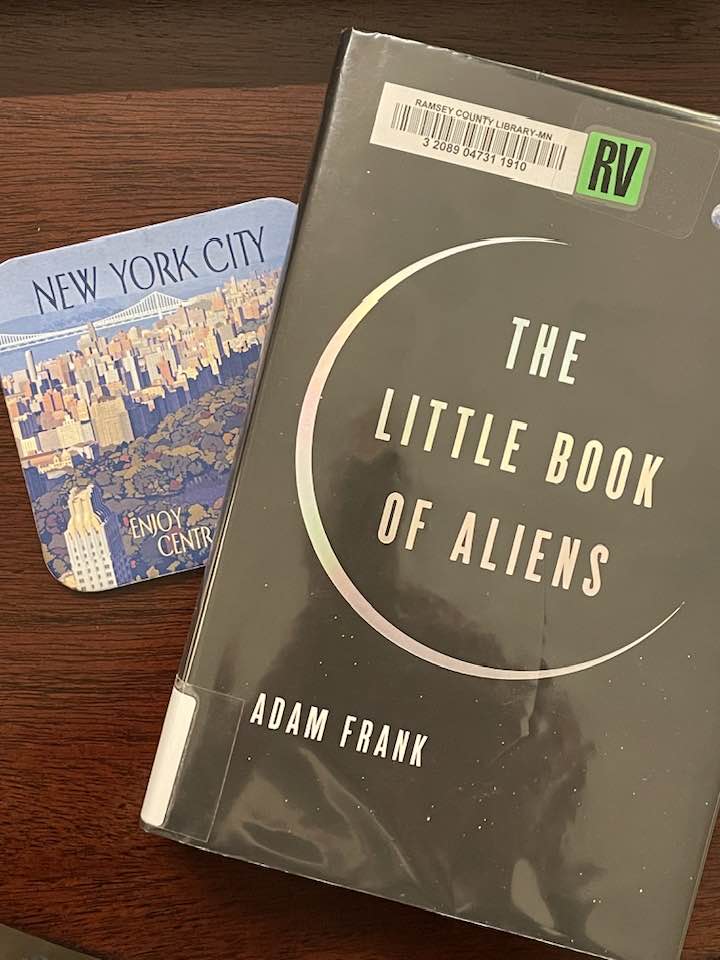MARCH 6, 2025 – About a year ago I was driving home one evening with the radio on. This was good timing, since the programming happened to feature an interview with Adam Frank, author of The Little Book of Aliens, which I mentioned in my March 1 post. When this month’s host of my book club proposed Frank’s work, I responded enthusiastically based on my recollection of the author’s fetching engagement in that radio interview. I would place Frank in the same league with Neil deGrasse Tyson and the late great Carl Sagan—astrophysicists with a highly developed talent for communicating with earthlings about aliens.
Frank’s “little book” about aliens uses earthlings’ fascination with UFOs (and little green men) as a springboard for a scintillating discourse on what I call “really big science”—that is, the science, if you will, of who we are, how we got here, and where we’re headed, given that we’re probably stuck here. In the process Frank effectively dismantles any scientific plausibility to the belief that UFOs (or little green men) are evidence of alien visitors. The compact 192-page book is a great companion to deGrasse Tyson’s 224-page Astrophysics for People in a Hurry. Except wait a sec: “compact” and “for people in a hurry” are misleading. Sure, the earnest reader can read each of these books in a modest amount of time, but to grasp matters securely requires much deeper attention, which, for most readers means slowing down to an infinitesimal nano-fraction of the speed of light. (For the record, the highly-touted time-bending speed of light isn’t nearly fast enough to get us very far (and back again) even within our own neighborhood within our own galaxy.)
The Little Book of Aliens is exceptionally accessible to the non-science-nerd. Frank’s punchy, humorous writing style is highly conversational—as if you and he are sitting at opposite ends of a bench in a leafy park on a pleasant day eating your ice-cream cones from the nearby kiosk. “Nice day for an almond fudge cone, huh?” he says amiably. Just then you notice that he too ordered almond fudge. This is all it takes. Away he take you into an entertaining talk about science and the absence of science behind the UFO phenomenon, but most remarkably, about the explosion of scientific inquiry that the fascination with aliens has engendered.
Soon Frank is leading you into the realm of SETI—search for extraterrestrial intelligence. Along the way you’re given a survey course not only in physics, but in chemistry, biology, and bio-chemistry. If at the outset of the journey you thought Earth was, well, a tiny speck of dust in the greater scheme of things, you’re soon forced to grapple with scales of magnitude too great to comprehend with regard to time and distance. After being schooled in recent discoveries and technological advances, you’re forced to ponder the implications for the search and potential discovery of aliens “out there.”
Ultimately, you’re forced to consider the psychological ramifications of two equally radical possibilities: 1. We’re alone; and 2. We’re not alone.
While reading the book aboard my recent flight from New York to Minneapolis, I was a “little” concerned that one of the passengers on either side of me in my cramped middle seat might see the title of the penultimate chapter: “Do Aliens Do It Too? What Will We Find When We Find Aliens?” I worried that the Earthings with wandering eyes might think I was reading some wacko book and that therefore, I must be wacko. Closing the book to reveal its title would confirm that assessment. I decided to hold on tight where I was, adopting an awkward grasp and using my thumbs to cover up the chapter title until I could turn the page. In fact, by the time I’d finished the chapter—somewhere over the state of Wisconsin—I was feeling quite a bit “wacko” but not become the cheese state had gone for Trump. The wacko effect was achieved by Frank’s questions about aliens: Is there life beyond the carbon-based? How might their minds operate? Would they have ethics? Would their biological era be short? What about “ancient aliens” that have had millions of years to evolve? The unsettling effect resulted when these questions were directed at us Earthlings. This reversed perspective felt much like jumping into a lake just after ice-out. It took my breath away.
As I struggled to overcome the cold shock and swim for the dock—and towel—all anxieties about life, public and personal, froze in place. In that respect The Little Book of Aliens served as an excellent diversion from the executive orders of the day. My fellow book club members—each a man of math and science but also each a close follower of current events—thought the book was a winner. I highly recommend that you too take the plunge. You will never think of life on earth in quite the same way you did before.
Subscribe to this blog and receive notifications of new posts by email.
© 2025 by Eric Nilsson
